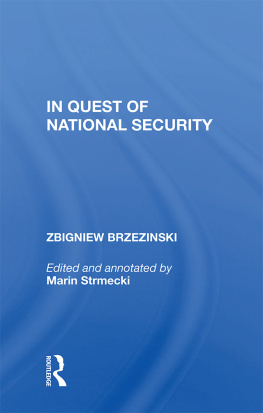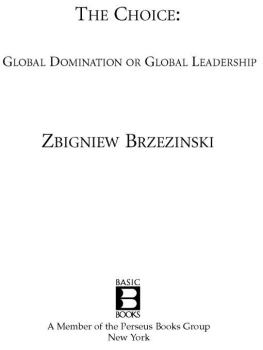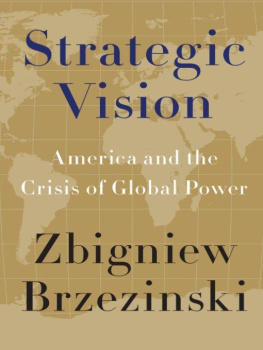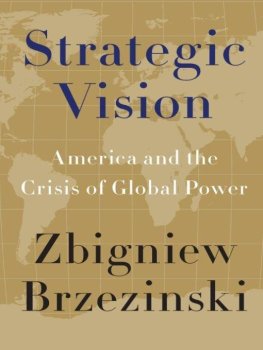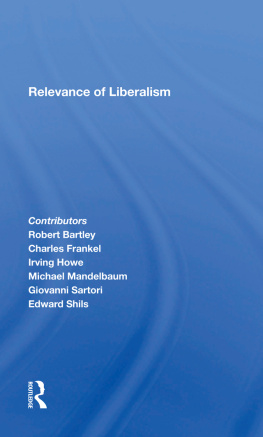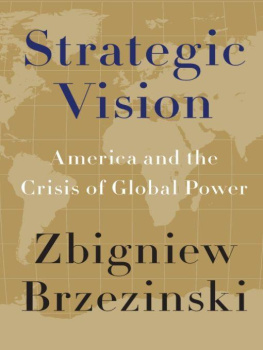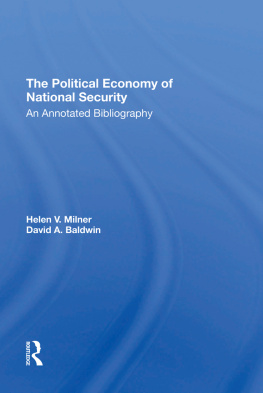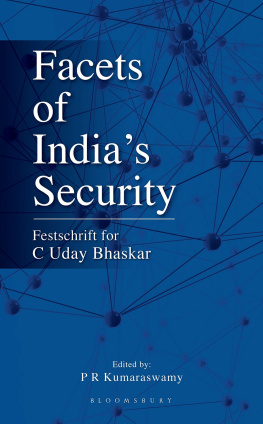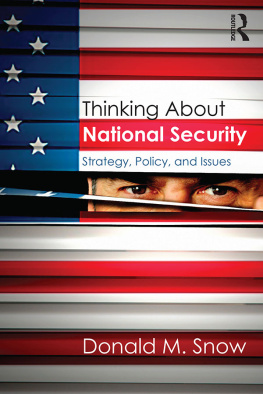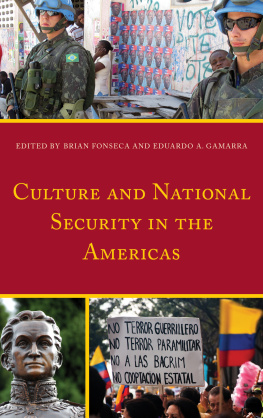First published 1988 by Westview Press
Published 2018 by Routledge
52 Vanderbilt Avenue, New York, NY 10017
2 Park Square, Milton Park, Abingdon, Oxon OX14 4RN
Routledge is an imprint of the Taylor & Francis Group, an informa business
Copyright 1988 by Zbigniew Brzezinski
All rights reserved. No part of this book may be reprinted or reproduced or utilised in any form or by any electronic, mechanical, or other means, now known or hereafter invented, including photocopying and recording, or in any information storage or retrieval system, without permission in writing from the publishers.
Notice:
Product or corporate names may be trademarks or registered trademarks, and are used only for identification and explanation without intent to infringe.
Library of Congress Cataloging-in-Publication Data
Brzezinski, Zbigniew K., 1928-
In quest of national security.
1. United StatesForeign relations1977-1981.
2. United StatesForeign relations1981
3. United StatesNational security. I. Strmecki,
Marin. II. Title.
E838.5.B79. 1988 327.73 88-10723
ISBN 13: 978-0-367-00552-8 (hbk)
THE ARTICLES AND SPEECHES appearing in this anthology, which span the years of the Carter and Reagan administrations, have been reproduced essentially as they were originally written or delivered. In order to preserve their authenticity in their specific context, no alterations of substance were made in these entries. Changes were limited to some minor stylistic copyediting and some short deletions from the older entries of highly dated material which illuminated only marginally the more timeless points under discussion. In this way, it is hoped that the reader will be able to trace both the threads of continuity in Dr. Brzezinski's views and the evolution of his thinking on the key issues related to U.S. national security.
I would like to thank several interns in Dr. Brzezinski's office whose assistance in word processing and proofreading were indispensable in producing this volume. They are Sabrina Spencer of Michigan State University, Creigh Yarbrough of Smith College, David Rea of Wesleyan University, Jean-Paul Paddack of Georgetown University, Cecilia Pulido of the University of California, Los Angeles, and Cindy Arends of Oregon State University.
Marin Strmecki
THIS BOOK BRINGS TOGETHER essays and speeches I have written and delivered, both in academia and in government, on the perennial question of national security. I do not use the term national security in the narrow sense of military security. While military power is one important dimension of the historical rivalry between the United States and the Soviet Union, it is unlikely to determine which rival prevails unless the contest leads to an apocalyptic military clash. Instead, I believe that national security involves wider considerations, including political statecraft, economic strength, technological innovation, ideological vitality, and others. An attempt to achieve national security without addressing these aspects of the problem will be only partially relevant and will likely fail.
The point of departure for the quest for national security must be a correct diagnosis of the nature of change in our time. In my view, the contemporary world is being altered by four interrelated revolutions: a political revolution, a social revolution, an economic revolution, and a military revolution. Their cumulative impact has already profoundly affected the distribution of global power, the competitive relationship between the two principal global rivals, and the stability of the U.S.-Soviet military balance. And these four revolutions will have an ever-greater effect in the years ahead.
The central substance of the political revolution is the attraction of democratic ideals. Today, the idea of human rights, the concept of self-government, the notion of a truly pluralistic political order are concepts which reflect the universal aspirations of mankind. These are evident around the world, and it is no exaggeration to state that we are living in an age in which human rights and individual liberty have become the historical inevitability of our time.
In Western Europe, Spain and Portugal evolved from dictatorships into liberal democracies in the 1970s. These democratic transformations showed that even over decades of uninterrupted rule, one-party fascist regimes could not muster the capacity to perpetuate themselves. The demise of these regimes stemmed from the fact that in their attempt to achieve total power they did not liquidate every island of autonomy in the social order. They did not eliminate every independent social and political organization, and as a result, these persisting islands of autonomy provided a jumping-off point for a gradual evolution away from the totalitarian model.
In the developing world, a spread of democracy has also taken place. In Latin America, nondemocratic countries are now a minority phenomenon, with such important states as Brazil and Argentina moving away from military dictatorships in recent years. The only significant exceptions to this trend are Chile, Cuba, and Nicaragua. In the Far East, democratic rule has returned to the Philippines and to South Korea. This phenomenon is clearly related to the spread of literacy, which has created more politically self-conscious and more self-confident publics, and to the process of urbanization, which has brought people closer together and fostered a more dynamic political interaction. It is also connected with the rise throughout the developing world of a professional and highly educated middle class.
Even in the Communist world, the manifestations of the global political revolution are clearly present. In China, the student demonstrations in late 1986 were an effort to expand the state's reform program into the political sphere. In Poland, the continuing strength of the underground Solidarity movement has led to a kind of self-emancipated society, complete with its own extensive daily press and publishing network. Moreover, in both, the state has sought to increase participation in the systemeconomic decentralization in China, and halting attempts at a limited political dialogue in Polandnot only on the basis of political initiatives from above but also as a consequence of social pressures from below. The outcomes are yet to be determined, but the phenomena are clearly present.
Not even the Soviet Union has escaped the impact of this worldwide trend. Mikhail Gorbachev has made it clear that he cannot undertake the reformation of the Soviet system without the active participation of the Soviet people. He has sought to animate the populace as an antidote to the stagnation of the system. In a recent address to the Soviet trade unions, he said, "The more democracy we have the faster we will progress along the path of restructuring, socialist renovation, and the more order and discipline there will be. So the question is this: Either we have democratization or we have social inertness and conservatism. There is no third way here." Also, in an extraordinarily suggestive public exchange during Gorbachev's recent visit to Prague, Gennadi Gerasimov, the Soviet spokesman, was asked what the difference was between Gorbachev and Alexander Dubcek, the leader of Czechoslovak Spring in 1968. Gerasimov answered with just two words: "Nineteen years."


